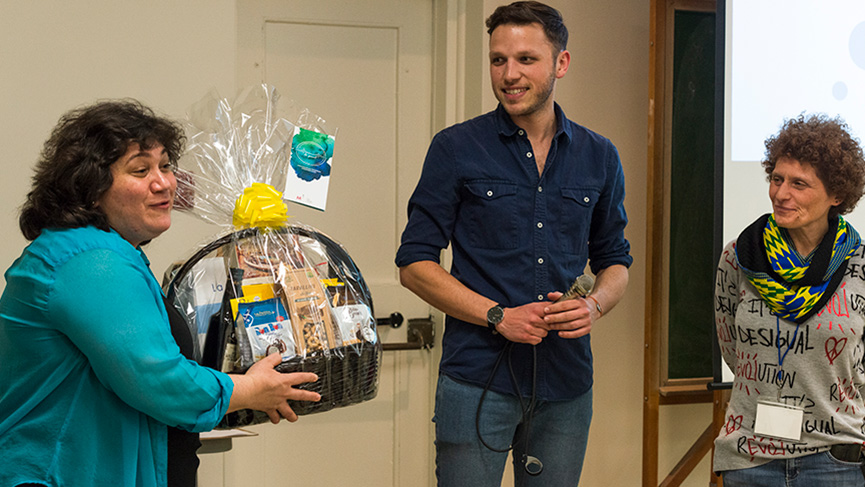Understanding Human Beings in their Complexity

Montreal
Le Pont recently held a conference for professionals working with vulnerable immigrant people. About a 100 participants attended this event to hear speaker Garine Papazian-Zohrabian talk about “Traumas, traumatic experiences, adaptability and resilience”.
“This conference changed our views on things in a radical way. We have literally shifted the way we approach beneficiaries,” said the coordinator of the emergency shelter, Arthur Durieux. The director of the Montreal Archdiocese sponsorship program for refugees and asylum seekers, Alessandra Santopadre, confirmed it: “After the conference, we attended online education training to improve our approach.”
Garine Papazian-Zohrabian, a psychologist and a lady of great humanity, has for more than an hour spoken about a subject she is passionate about: traumas and resilience. “This is a heavy topic, but filled with humanity. We will talk about difficult moments and experiences we encounter in life, but also about resilience and adaptability.”
“Wearing different pairs of glasses”
“We must avoid tagging people and finding them pathologies. The more we limit our view on things, the more we are bound to miss on some while listening to someone,” insisted Garine Papazian-Zohrabian. Due to the complex nature of human beings, one cannot refer to a sole theory to explain behaviours. We must explore interiority, feelings and influences (beliefs, family, general knowledge). Different ways are, therefore, required when approaching people coming from various backgrounds.
If when studying traumas several necessary approaches are required, it can be said that not everything is a source of “trauma”. Some people can adapt, some cannot. Numerous factors can contribute to the development of strategies, said Garine Papazian-Zohrabian. The participants received indications as to how to detect and evaluate traumas. Among those participants, the social workers, spiritual guides and volunteers from social centres valued those indications. They were actually preoccupied by trauma detection. Detecting traumas is not especially easy when, due to the lack of time and trust, only one meeting takes place.
At times, the depth of traumas can be great and require that contexts be explored – family ties, relationships, perceptions, values, beliefs and facts – ,explained the speaker. “From an institutional standpoint, this is a challenge caused by the fragmentation of the system. A holistic approach is required (physical, psychological, social); not everything needs to be diagnosed. We must take into account stories, cultural origins and feelings. Taking care of a child, for instance, means also taking care of the parents.”
Taking the time to listen
Garine Papazian-Zohrabian also focused on intervention practises to use with people who have had traumatic experiences: What do we do and how to we do it?
A global approach is required. Individuals must be offered means, spaces and enough time to speak freely without having to repress their feelings. As Garine Papazian-Zohrabian explained, being able to hear the hatred and the anger one holds deep within is sometimes difficult. We want to avoid dehumanizing people and for that to happen we need to take their feelings into account. When they express their feelings freely, we can take care of inappropriate behaviours.
An individual can show resilience and be able to spring back up after a traumatizing experience. Everyone experiences resilience differently according to his or her environment, or the ability to envision the positive outcome of an event or to establish links with the surroundings. Appropriate mechanisms can then be offered, resilience being a dynamic and progressive process.
“The justice system, lawyers, teachers and the state must be informed on that matter!”
During the question period, Arthur Durieux stressed the relevance of the speaker’s remarks in view of the people he meets at the centre. Some participants brought up the problem related to time perspective among people with traumas. “Confusion due to time perspective can help detect traumas,” had mentioned Garine Papazian-Zohrabian earlier. “Their requests are not being taken into account due to the lack of time reference. The justice system, lawyers, students and the state must be informed of that matter!” There is a need to meet with beneficiaries more than once said Regina, a volunteer at Le Pont. Schools and community organizations can increase that access: “we wish to prevent, not to put out fires”.
The participants left this enlightening conference with good tools for intervention. Garine Papazian-Zohrabian shared with them online training resources essential to any professional working with vulnerable immigrant people.
*Garine Papazian-Zohrabian is Associate professor at the Département de psychopédagogie et d’andragogie from the Faculté des sciences de l’éducation at Université de Montréal. She is also a member of the Ordre des psychologues du Québec and also a researcher member of SHERPA

Comment
Comment
Add new comment